Key takeaways:
- Criticism is a powerful tool for artistic growth, prompting reflection on intent and encouraging the separation of personal identity from artistic work.
- Constructive feedback can lead to breakthroughs and unexpected improvements, enhancing the artist-audience relationship.
- Embracing criticism fosters resilience and can turn negative experiences into motivation for creative exploration and refinement.
- Building a supportive network is crucial for artists to navigate criticism and maintain their passion for creating art.
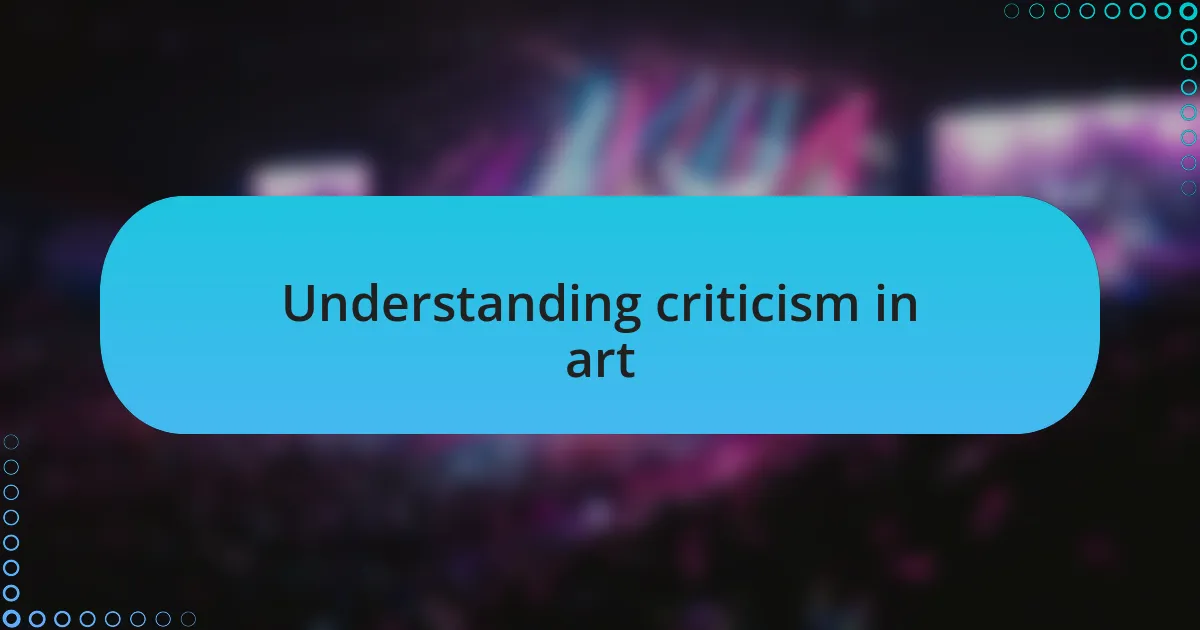
Understanding criticism in art
Criticism in art is a double-edged sword; it can stung deeply or ignite a blaze of creativity. I remember releasing a song that I poured my heart into, only to receive feedback that felt more like a punch than a critique. It made me question, what is it about this feedback that bothers me? Exploring that question became part of my growth as an artist.
When I receive criticism, I often reflect on the intent behind the words. Is it meant to help me grow, or is it merely an opinion without depth? For instance, after a harsh review of a live performance, I began to appreciate constructive criticism more. Recognizing that not all feedback is personal alleviates the weight I sometimes place on my shoulders.
Understanding criticism involves distinguishing between helpful insights and mere noise. When I encounter differing opinions from fans or fellow musicians, I remind myself that art is subjective. Each person’s perception is shaped by their experiences, and that diversity of thought can actually enrich my work if I allow it to. After all, isn’t the goal of art to evoke feelings and provoke thoughts?
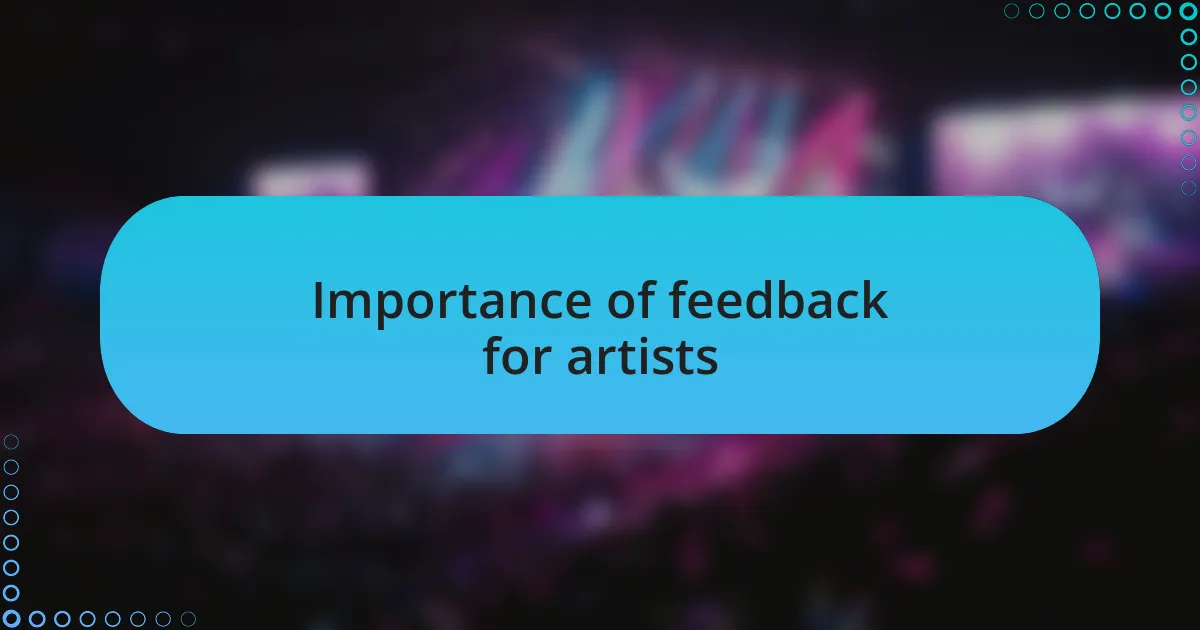
Importance of feedback for artists
Feedback serves as a vital compass for artists navigating the unpredictable waters of creativity. I remember a time when a mentor pointed out the pacing issues in one of my songs. Initially, it was disheartening; however, implementing their suggestions transformed the piece into something much more impactful. That experience taught me how embracing feedback can lead to unexpected breakthroughs.
Moreover, feedback offers a fresh perspective that I might not have considered. Sometimes, artistic choices that feel clear to me can confuse or alienate listeners. I recall performing at a small venue, and after the show, an audience member candidly shared how a certain lyric resonated with them in a way I hadn’t anticipated. That moment reinforced my understanding that the artist-audience relationship thrives on honest communication.
Ultimately, seeking and valuing feedback can lead to continuous improvement. I’ve realized that every bit of constructive criticism is an opportunity to refine my craft and expand my artistic horizons. It invites a dialogue with my audience, allowing me to grow not only as a musician but also as a storyteller. Isn’t it enriching when our work connects with others in ways we never imagined?
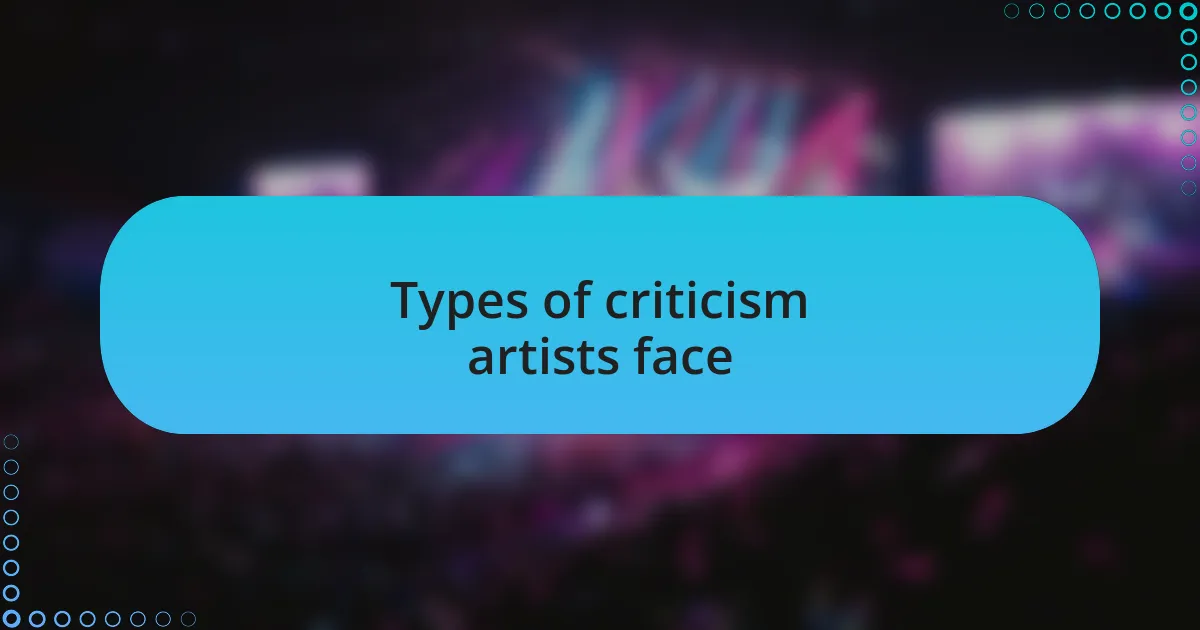
Types of criticism artists face
Every artist encounters various types of criticism, and understanding them can shape the creative journey significantly. One common form is constructive criticism, which aims to provide helpful feedback on specific aspects of an artist’s work. I recall when a producer critiqued my album’s vocals, suggesting I explore different vocal techniques. Although it stung at first, I dove into the exploration, leading to a richer, more layered sound that I might not have achieved without that push.
On the flip side, there’s also subjective criticism, which often stems from personal tastes rather than technical flaws. I’ve faced this when some listeners didn’t connect with a song I poured my heart into. Reading the critiques felt like a personal affront, but I learned that music is ultimately a matter of preference; what resonates with one listener may not resonate with another. It taught me to separate my identity from my art, allowing me to grow without being solely defined by someone else’s opinion.
Another significant type is public criticism, often amplified through social media. I vividly remember sharing a new track online and receiving a flood of mixed responses. While some praised it, others unleashed harsh comments. At that moment, I felt exposed, yet I chose to focus on the positive feedback. That experience reminded me that public platforms can amplify both support and negativity, and navigating this landscape requires resilience and a strong sense of self. How do you handle criticism when it comes pouring in?
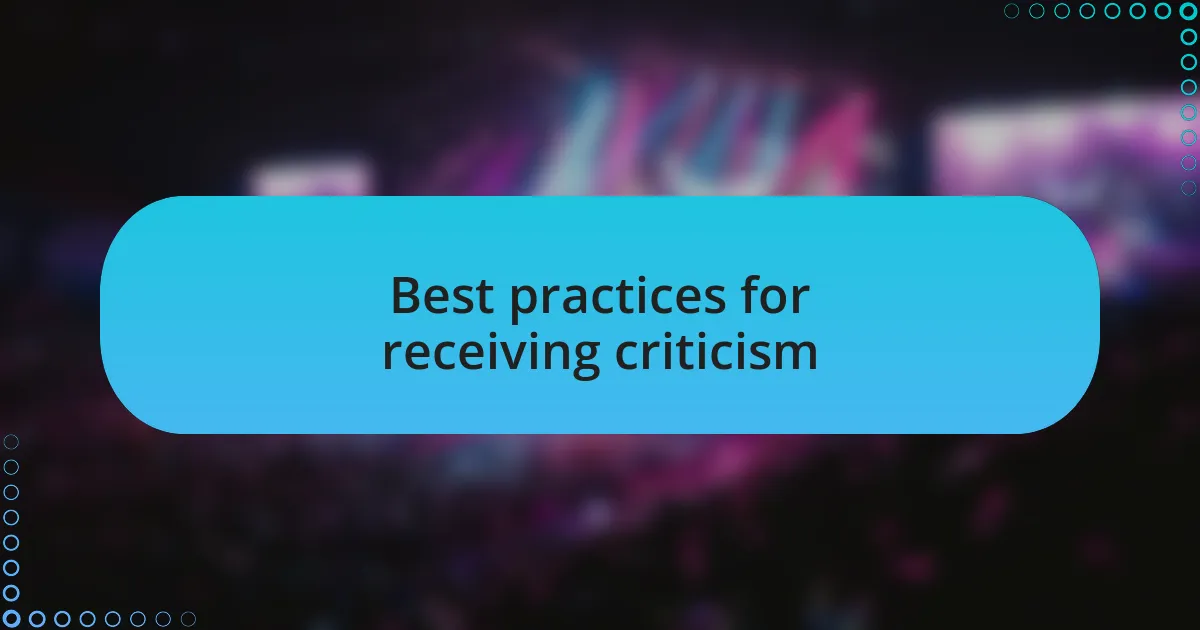
Best practices for receiving criticism
When receiving criticism, it’s essential to approach it with an open mind. I often find myself reminding my bandmates and me to actively listen before reacting, especially during rehearsals when feedback can feel overwhelming. For instance, I recall a time when a fellow musician offered suggestions on our song arrangement. Instead of bristling at the changes, I took a step back to appreciate their perspective. This shift in perspective created a more collaborative environment, allowing us to create something stronger together.
Another best practice is to differentiate between constructive and unconstructive feedback. I experienced this firsthand when a music review labeled one of our songs as “forgettable.” Initially, it felt like a blow to the gut, but reflecting on it revealed a broader truth: feedback often reflects more about the reviewer than about my work. Asking myself questions like, “What can I learn from this?” or “Is there a nugget of truth here?” helped me focus on what matters rather than dwelling on hurtful comments.
Lastly, it’s crucial to foster a support system. My music journey benefits immensely from friends and fellow artists who provide balanced opinions while encouraging me during difficult criticism moments. I remember a particularly challenging time when I wanted to quit after receiving harsh feedback on my lyrics. A close friend reminded me why I started creating music in the first place, helping me regain my passion. Perhaps surrounding yourself with supportive voices could be your golden ticket to thriving in the face of criticism.
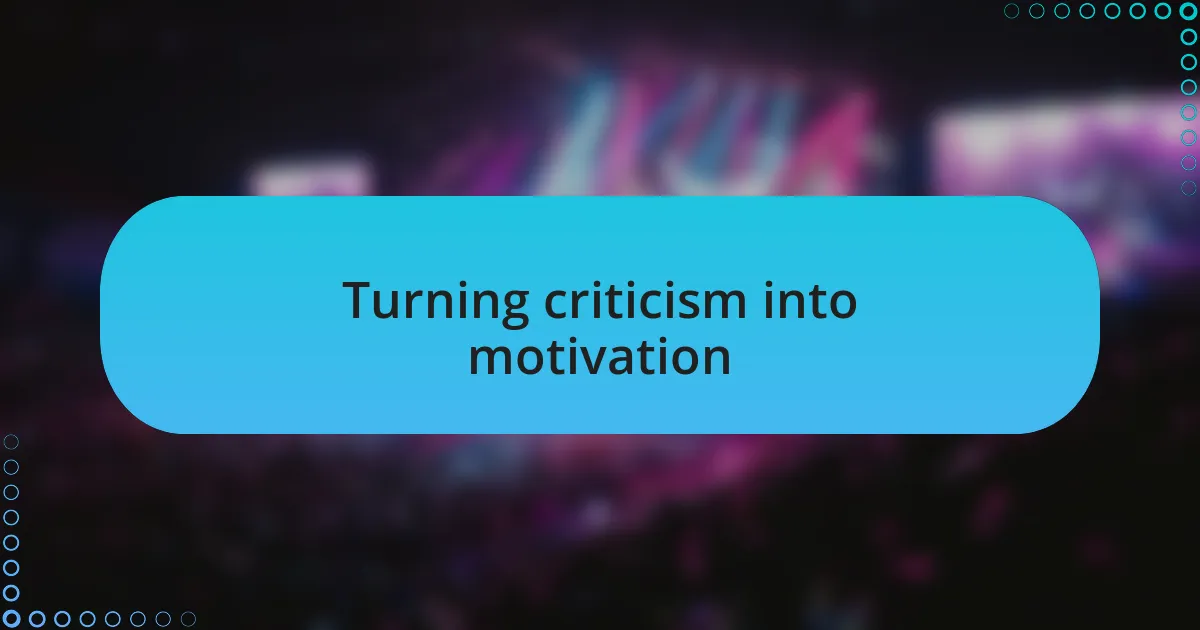
Turning criticism into motivation
Criticism can feel like a punch to the gut, but I’ve learned to convert that pain into fuel for my creative journey. For example, after receiving a review that felt overly harsh, instead of sulking, I dove into my songwriting process with renewed vigor. That experience taught me that every criticism holds a lesson waiting to be discovered, pushing me to refine my skills and dig deeper into my artistry.
One moment that stands out is when our group faced feedback on a live performance that pointed out a lack of energy on stage. Initially disheartened, I sat down with the band and shared my thoughts: What can we do to ignite that spark? This conversation transformed criticism into a brainstorming session, leading us to experiment with new stage dynamics that electrified our performances. It was a powerful reminder that negative feedback is often a path to greater creativity, rather than a dead end.
It’s fascinating how a shift in mindset can turn doubts into determination. When I reflect on moments when I’ve faced criticism, I remind myself of that old adage: what doesn’t kill you makes you stronger. Embracing criticism doesn’t mean blindly accepting it; it’s about using it as a catalyst for growth. Why not see criticism as a stepping stone that leads to your next big breakthrough? Acknowledging fear while pushing through can turn a painful moment into a defining one in your artistic journey.
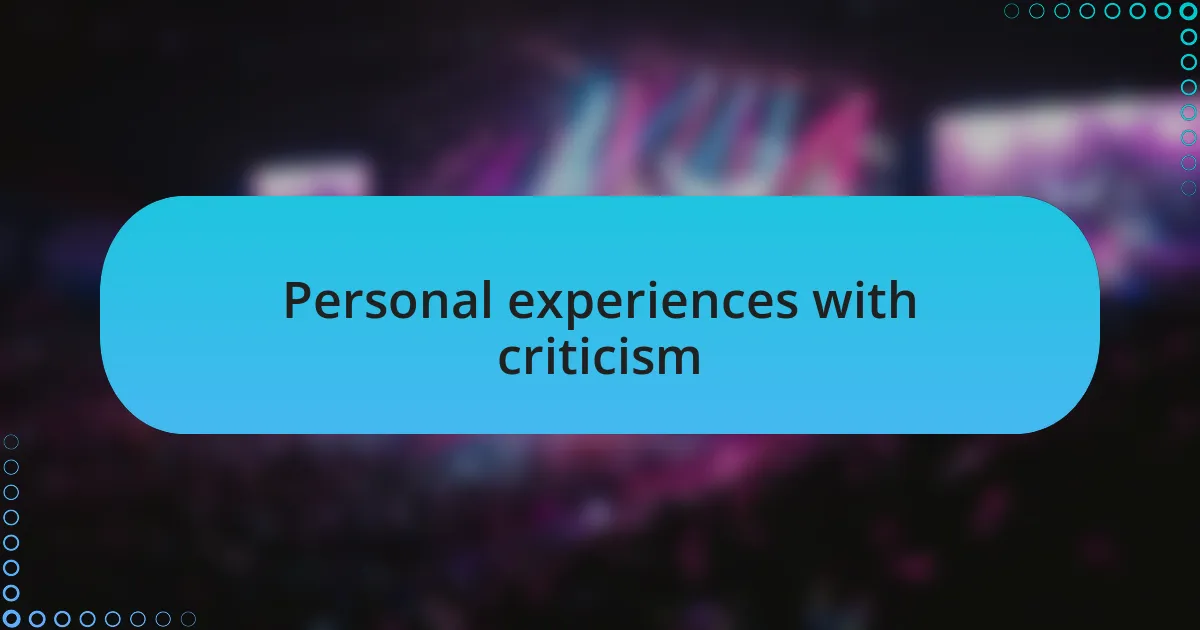
Personal experiences with criticism
There was a time when I released a single that didn’t resonate as I had hoped. The mixed reviews left me questioning my musical direction. Instead of retreating, I took a moment to really listen—what were the critics saying? That experience taught me that feedback can be a mirror reflecting not just flaws but also areas ripe for growth.
I recall a particularly tough round of critiques after a local showcase. One critic described my lyrics as “clunky,” and for days, those words echoed in my mind. Instead of internalizing the sting, I asked myself: what if there’s truth in that? I spent the following weeks revisiting my lyrics, refining them, and seeking feedback from trusted friends. It was an uncomfortable process, but it sparked a creative resurgence, resulting in one of my most meaningful tracks.
What I’ve realized is that criticism often targets our own insecurities. I remember sharing a raw, emotional song with a close friend. Their honest feedback cut deep initially, but after reflecting, I acknowledged that their perspective helped me shape a powerful narrative. In moments like these, it’s essential to separate personal feelings from constructive dialogue—because sometimes, those harsh words can lead to the most honest and authentic art we create.